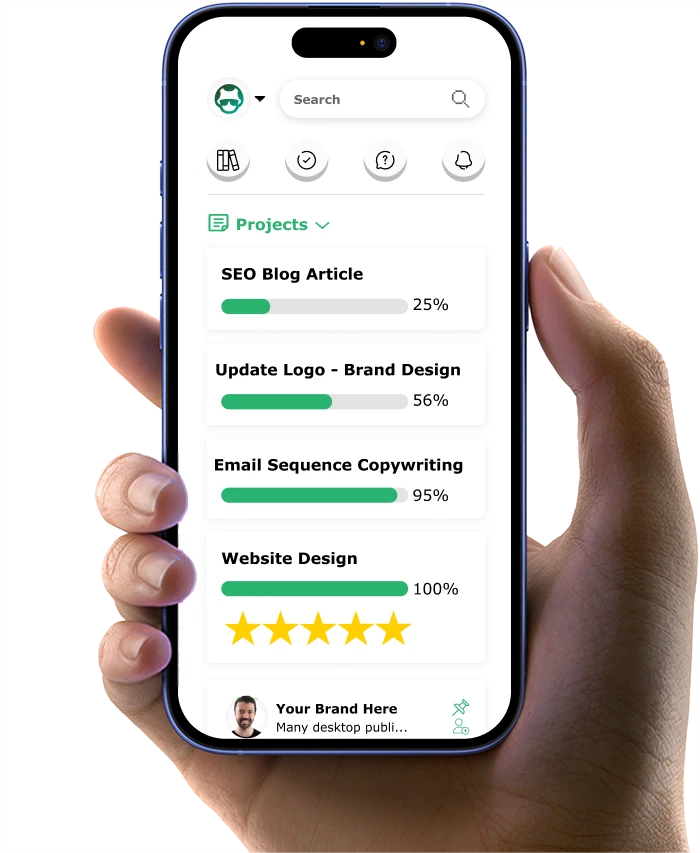7 Cool Little Non-AI Tips to Convert Leads on LinkedIn (No Ads, For Beginners)
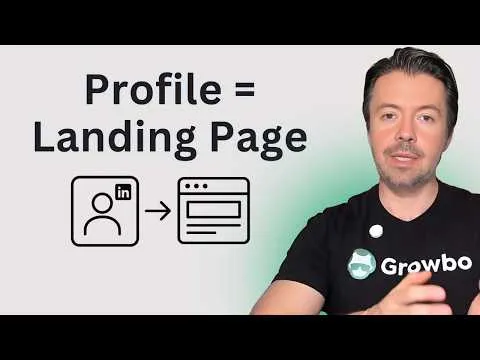
LinkedIn is full of noise and it’s hard to stand out and make real business connections…
Most people scroll past endless posts that all sound the same–self congrats posts, cringe / rage bait, and tips and case studies but usually they’re salesy in tone.
Authentic content cuts through the AI-generated noise that's flooding the platform.
When I first started posting, my updates felt awkward. But each day, I’ve learned what worked.
In today’s video / article, I’m sharing 7 cool little non-AI tips to attract and convert leads on LinkedIn—without spending money on ads or relying on AI auto-slop.
You’ll learn:
- How to hook readers in the opening seconds so they can’t help but click “see more.”
- Transform your profile into a conversion magnet — Use overlooked features to turn profile views into eager leads and real business conversations.
- Unlock the power of daily micro-actions — Learn the small, repeatable steps that build momentum and get LinkedIn’s algorithm working for you.
Every strategy in this article builds on the last—so if you want to finally break through the noise on LinkedIn and start seeing real results, let’s dive in…
Want to get all your marketing and funnel work done—without the headaches of hiring a team? Download our free guide: 33 Marketing Projects You Can Delegate to Growbo and discover how to save 100+ hours a month, grow faster, and scale without the overhead.
Non-AI LinkedIn Tip #1: “Natural Cringe” Wins Attention
There's a lot of cringe content on LinkedIn. By cringe, I mean awkward, trying too hard, or just not landing the message well. But that's not a bad thing. The awkwardness makes it easier for you to stand out.
Here's the truth: Natural cringe is better than AI slop cringe (lol it sounds odd but… it’s true!).
You see, there's a huge temptation today to just use AI—"I'll automate my posts, get followers, impressions, and it's all automatic."
But while that can work in some cases, it usually just gets copied and automated. There's a level of domain expertise and authentic communication that only you—as a human—can deliver.
The image below highlights why humans remain superior — creativity, logic, judgment, intuition, and common sense. Unlike machines, humans can think beyond data, feel emotions, make moral choices, and adapt in ways technology still can't replicate.

Your authentic voice, especially if you're the founder or owner, is an expression of your brand. When you communicate naturally, you magnetically attract people.
We've become machines in a way—bombarded with over 2,000 advertising messages per day. This has forced us to become more discerning about what's commercial versus authentic human communication.
If you're tempted to use AI to write your posts, stop it. Use AI to generate ideas, but rewrite them in your own voice. It's okay to struggle a little bit when you're starting out.
It's better to be authentically a little cringe than to be AI slop cringe. People will tune out AI-generated content. But if you're genuine and coming from a place of authenticity, people are much more likely to resonate with you—because at least you're being human.
Non-AI LinkedIn Tip #2. Use Custom CTAs Everywhere
This is what drives people to your website or newsletter (lead magnet). It appears right at the top of each LinkedIn post.
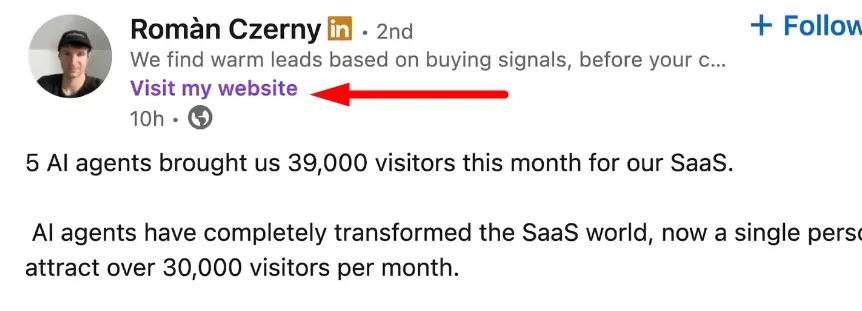
To do this, you need to become a LinkedIn Premium member. It costs around $30 per month annually, or $52 per month if paid monthly. In my opinion, it's worth it just for the CTA.
Every post is like a mini landing page. If you do a good job, people are more likely to check out your website or newsletter.
You can't customize the text of the CTA—it has to be "visit my website" or "visit my newsletter." But you can offer a lead magnet (like a checklist or template) to increase opt-ins.
LinkedIn Premium doesn't boost your visibility in the newsfeed, but it does help with network expansion and discovery. Still, the CTA feature alone is worth the investment.
The first month is free to try. We signed up, and it's been great so far.
Non-AI LinkedIn Tip #3. Algorithm Alignment Over Followers
Aligning your content with the LinkedIn algorithm is more important than your follower count. If LinkedIn judges your content as valuable, it will show it to more people.
LinkedIn wants people to stay on the platform and interact.
The next image highlights how LinkedIn’s algorithm now favors valuable, knowledge-based posts. There’s been a massive 40% increase in people viewing posts centered on advice and insights from users outside their network.
That means great content can now reach far beyond your immediate connections — even if you don’t have a huge following.
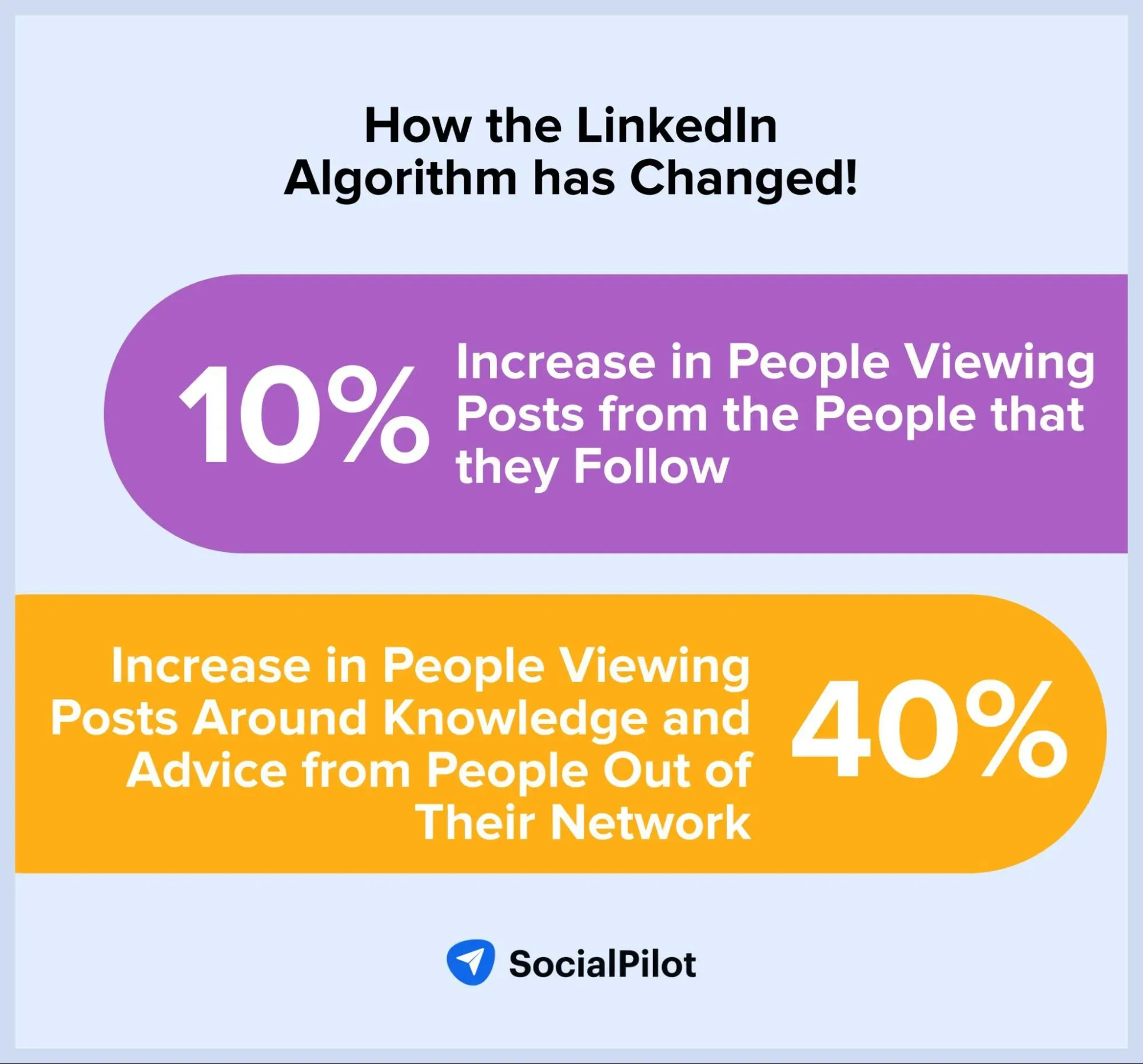
How do you know if you're aligning with the algorithm? Study what works for others, both inside and outside your market.
Model what they're doing, but make it your own. Also, study what doesn't work. Compare profiles that are getting good results with those that aren't. You'll start to see the gaps.
Often, it's about tone and effort. Don't just post whatever AI gives you. Put in a little critical thought. It doesn't take much time, and it will grow your sales and leads.
Non-AI LinkedIn Tip #4. Post Daily, Learn Fast
The way to achieve algo alignment is through repetition. Post daily.
Devote about an hour each day to writing your LinkedIn posts. Include an image or video. Do this for at least one month.
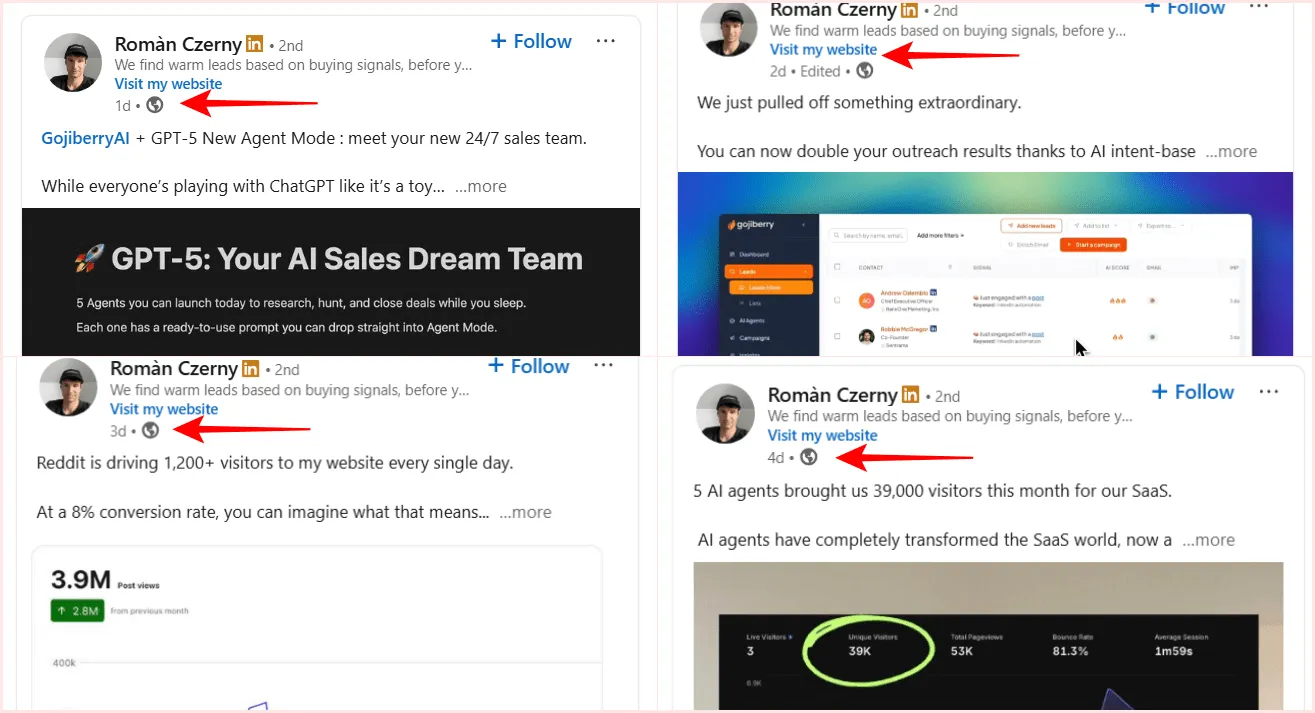
Every day, you'll get feedback from the algorithm—distribution, followers, likes, comments.
You'll learn what resonates and what the algorithm wants. Sometimes your posts will get hundreds or thousands of views, sometimes only a handful. That's normal. The key is to keep posting and learning.
Non-AI LinkedIn Tip #5. Profile CTAs Drive Results
You don't need LinkedIn Premium for this. Add a CTA link to your profile.

Many people will check your profile after seeing your posts. This is your chance to drive them off LinkedIn and into your funnel.
You can customize the CTA keywords here. For example, "Find and contact warm leads."
Make sure the landing page headline matches the CTA text for maximum alignment. Treat your profile like a landing page. The goal is to drive conversions and leads.
The following chart shows how powerful Smart CTAs can be. While default and multivariate CTAs hover around just over 1% conversion, Smart CTAs jump to nearly 4%.
It’s a clear reminder that when your profile CTA is personalized and aligned with your audience, the results can multiply fast.
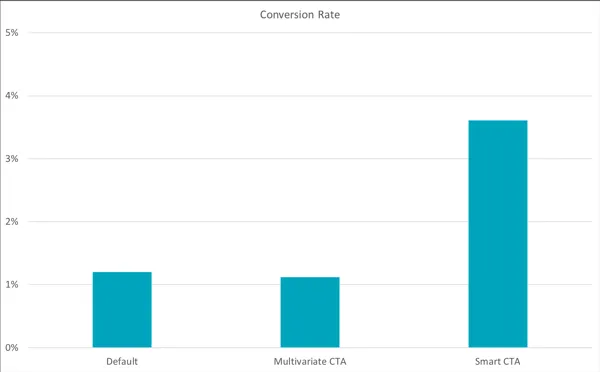
Non-AI LinkedIn Tip #6. Optimize Profiles Using Proven Principles
Apply the law of repetition: mention your brand multiple times. Make it easy for people to type your web address directly rather than searching Google.
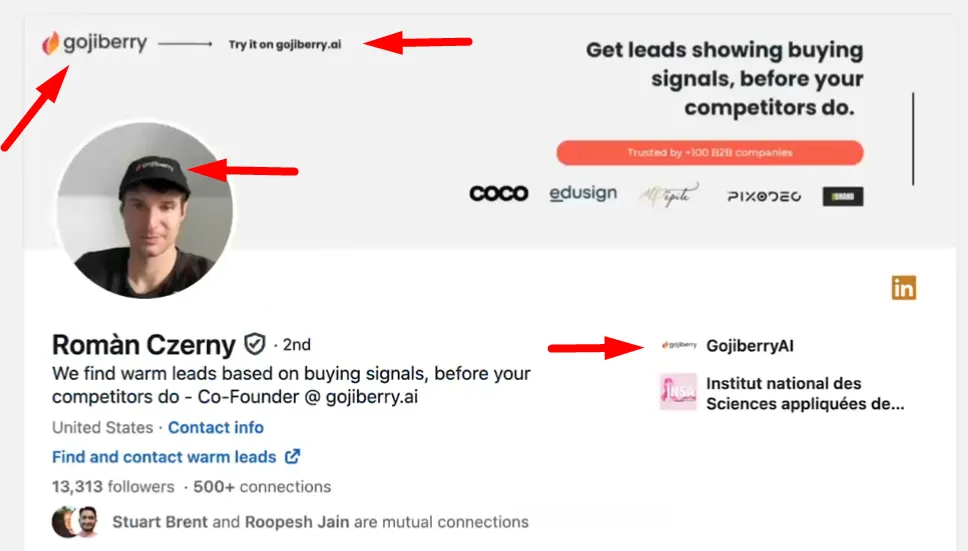
Think about brand associations. Who do you want to associate your business with? Optimize your visible connections and follows.
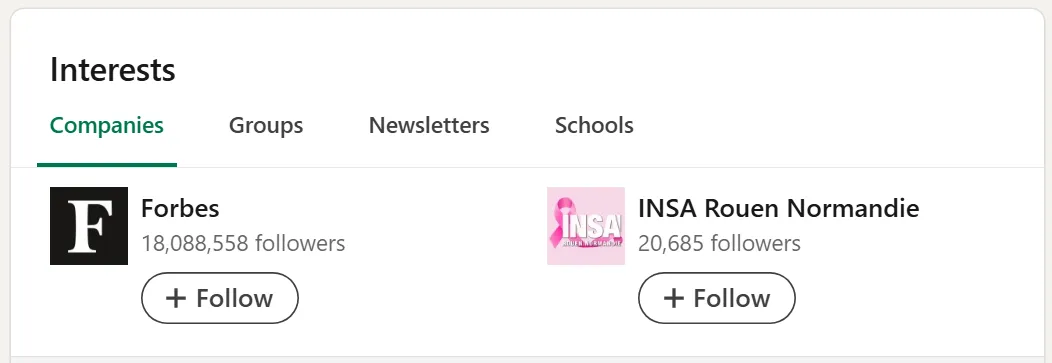
Fill out the recommendations section with recent testimonials. These are social proof and help build trust.
Offer to exchange testimonials with other professionals. Make sure they're well-written and mention both you and your company.
The chart that follows from BrightLocal shows just how powerful consumer trust really is. Nearly half of people (46%) trust online reviews as much as personal recommendations from friends and family.
That means well-written testimonials on your profile aren’t just nice to have—they carry real influence. The data proves that reviews and social proof can elevate your credibility just like a personal referral.
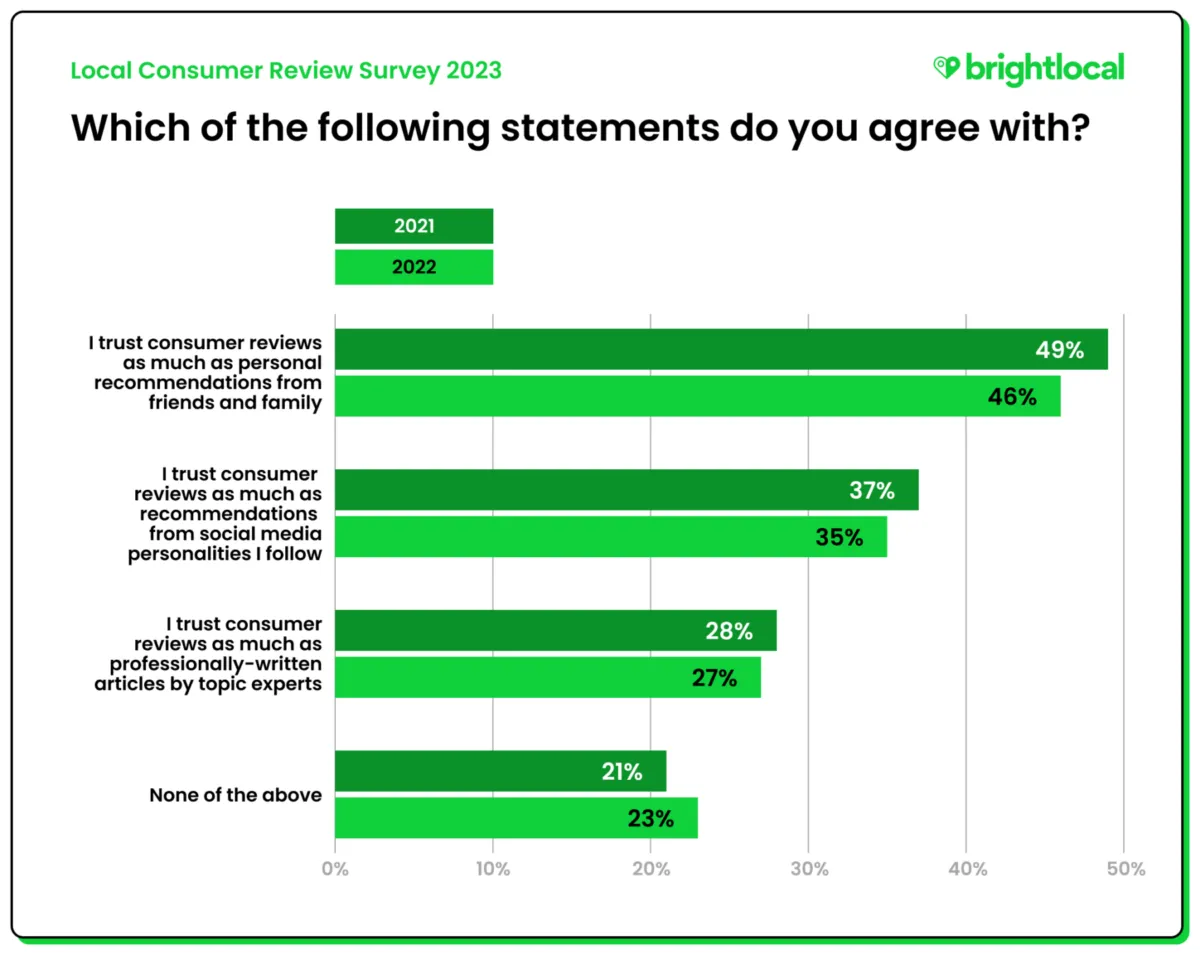
Also, pay attention to the brands and people you associate with on your profile, as these associations can influence how visitors perceive your business.
Non-AI LinkedIn Tip #7: Don't Bury the Lead
When posting on LinkedIn, don't bury the lead, as they say in journalism. People only see the top two or three lines of your post before they have to click "read more."
The first line is like your title—it's a high point of leverage. People are much more likely to read that than anything else in your post.
So spend the most time optimizing the first one or two sentences to persuade people it's worth their time to keep reading.
For example, look at these strong opening from Cyril Cotte:
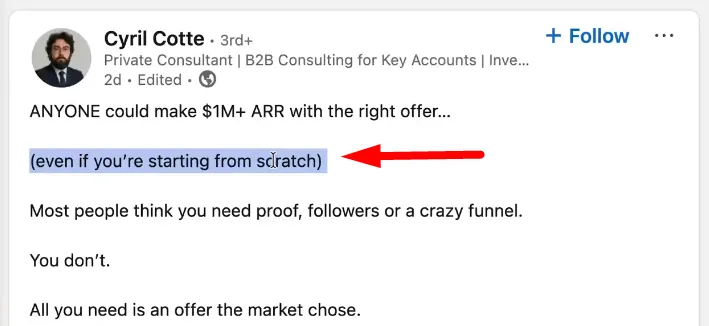
This makes a bold claim that begs the question: How? It creates curiosity. The parenthetical addition "(even if you're starting from scratch)" handles potential objections and draws in beginners.
Another example from Roman Czerny:
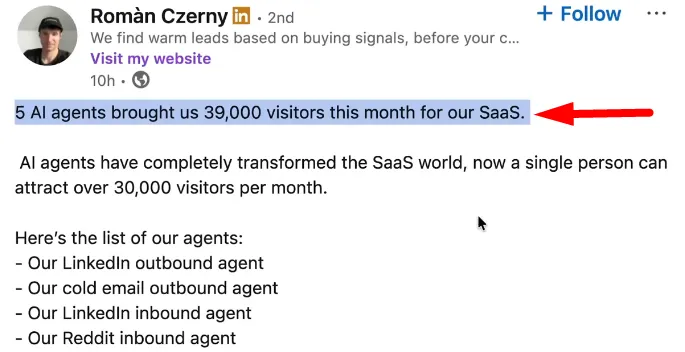
This uses a specific number and creates an open loop—questions automatically pop into readers' minds:
- What are these agents?
- How do they work?
- How autonomous are they?
- Even if you're not in SaaS, you're interested in driving more traffic using AI.
This next chart shows how most people consume content online today—and it proves why grabbing attention early matters. A full 34% of readers only read headlines and maybe one or two stories in full, while just 19% read every word.
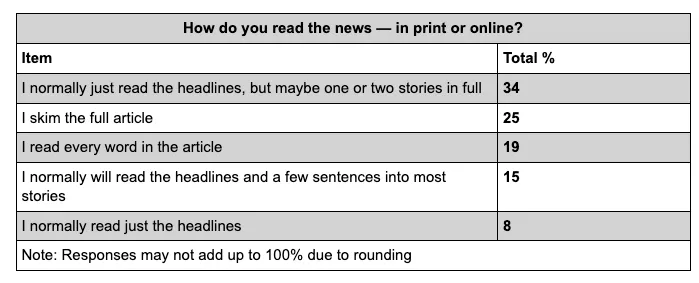
Most people skim. That's why your first line has to hook them instantly before they scroll past.
Make a strong claim, use specific numbers, or create an open loop that encourages people to click "read more." This is where you should invest the most effort in crafting your LinkedIn posts.
(Bonus) Non-AI LinkedIn Tip #8. Master LinkedIn Content Types
There are different types of LinkedIn posts—top of the funnel, middle of the funnel, and bottom of the funnel.
- Top of the funnel: broad awareness, storytelling, memes, insights.
- Middle of the funnel: specific ideas or tips aligned with your product or service.
- Bottom of the funnel: testimonials, case studies, offers, and direct CTAs.
Be strategic with your content mix. If your goal is maximum distribution, focus on top-of-the-funnel content.
For instance, you might prepare a resource (like a Google Doc) that you can send to people who engage. However, a better structure is to ask people to follow you and then comment with a specific keyword like "offer," "agent," or "gimme" to receive the resource. You may have seen other marketers do this on LinkedIn such as Rom Czerny:
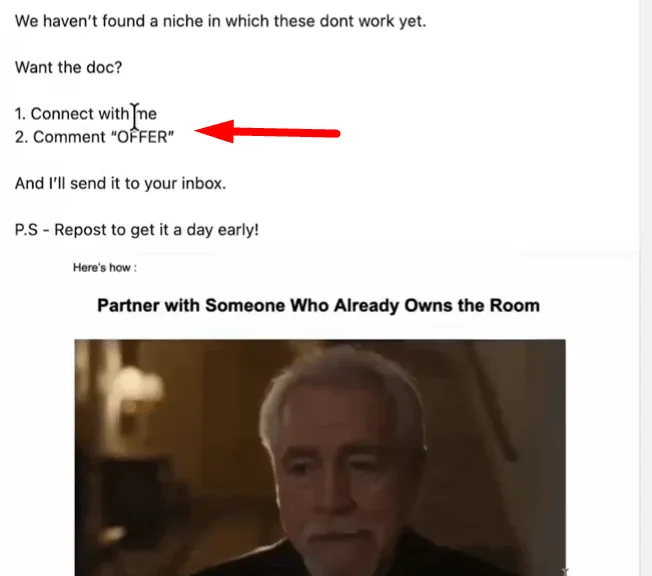
Be strategic with your content mix based on your goal. If your goal is maximum distribution and reach, focus on top-of-the-funnel content. If you're trying to drive sales and leads directly, incorporate more bottom-of-the-funnel content.
Here’s what bottom of the funnel content might look like (i.e. it talking about the product or service and how it helps customers, as well as framing it as relevant to “now”):
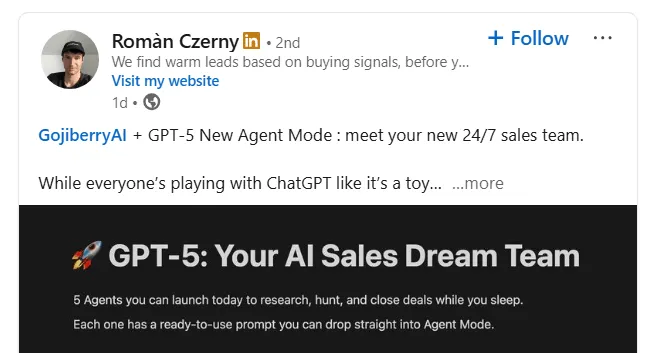
The key is understanding that each post type serves a different strategic purpose in moving people through your funnel.
Conclusion
The 7 tips + bonus tip we've covered don't require a massive budget or advanced technical skills. What they do require is consistency, authenticity, and a willingness to show up daily with value.
The beauty of these strategies is that they compound over time. Each post you publish, each CTA you optimize, and each testimonial you add works together to build your credibility and expand your reach.
Remember, you're not just chasing followers—you're attracting the right people who need what you offer.
If implementing these LinkedIn strategies feels overwhelming alongside everything else on your plate, that's where Growbo comes in. We handle your marketing projects—from content creation to funnel optimization—so you can focus on closing deals and growing your business. Think of us as your marketing team without the overhead.
Now it's your turn: Which of these tips are you going to implement first? Drop a comment below and let me know what your biggest LinkedIn challenge has been. I'd love to hear what's working (or not working) for you
Keep Growing, Stay Focused,
Image Credits:
- https://imageio.forbes.com/specials-images/imageserve/62e8dd5aba8e1171f5006ee1/0x0.jpg?format=jpg&width=1200
- https://www.socialpilot.co/blog/linkedin-algorithm
- https://intentpublications.blogspot.com/2023/06/15-call-to-action-statistics-you-need.html
- https://influencermarketinghub.com/social-proof-statistics/
- https://www.nichepursuits.com/blog-statistics/



